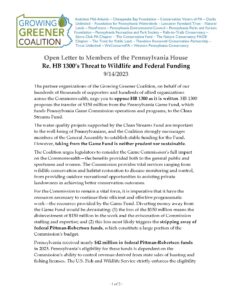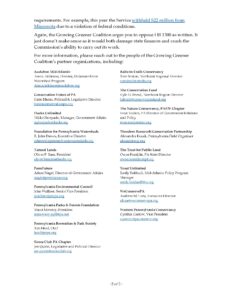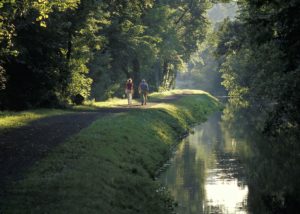The partners of the Growing Greener Coalition sent the following letter to legislators (text and images below, pdf linked) in opposition to HB 1300, which would divert funding from the Game Commission, triggering an additional loss of federal Game Commission funding:

Honorable Member of the Pennsylvania House of Representatives:
The partner organizations of the Growing Greener Coalition, on behalf of our hundreds of thousands of supporters and hundreds of allied organizations across the Commonwealth, urge you to oppose HB 1300 as it is written. HB 1300 proposes the transfer of $150 million from the Pennsylvania Game Fund, which funds Pennsylvania Game Commission operations and programs, to the Clean Streams Fund.
The water quality projects supported by the Clean Streams Fund are important to the well-being of Pennsylvanians, and the Coalition strongly encourages members of the General Assembly to establish stable funding for the Fund. However, taking from the Game Fund is neither prudent nor sustainable.
The Coalition urges legislators to consider the Game Commission’s full impact on the Commonwealth—the benefits provided both to the general public and sportsmen and women. The Commission provides vital services ranging from wildlife conservation and habitat restoration to disease monitoring and control, from providing outdoor recreational opportunities to assisting private landowners in achieving better conservation outcomes.
For the Commission to remain a vital force, it is imperative that it have the resources necessary to continue their efficient and effective programmatic work—the resources provided by the Game Fund. Diverting money away from the Game Fund would be devastating: (1) the loss of the $150 million means the disinvestment of $150 million in the work and the evisceration of Commission staffing and expertise; and (2) this loss most likely triggers the stripping away of federal Pittman-Robertson funds, which constitute a large portion of the Commission’s budget.
Pennsylvania received nearly $42 million in federal Pittman-Robertson funds in 2023. Pennsylvania’s eligibility for these funds is dependent on the Commission’s ability to control revenue derived from state sales of hunting and fishing licenses. The U.S. Fish and Wildlife Service strictly enforces the eligibility requirements. For example, this year the Service withheld $22 million from Minnesota due to a violation of federal conditions.
Again, the Growing Greener Coalition urges you to oppose HB1300 as written. It just doesn’t make sense as it would both damage state finances and crush the Commission’s ability to carry out its work.
For more information, please reach out to the people of the Growing Greener Coalition’s partner organizations, including:
Audubon Mid-Atlantic
Aneca Atkinson, Director, Delaware River Watershed Program
Conservation Voters of PA
Katie Blume, Political & Legislative Director
Ducks Unlimited
Nikki Ghorpade, Manager, Government Affairs
Foundation for Pennsylvania Watersheds
R. John Dawes, Executive Director
Natural Lands
Oliver P. Bass, President
PennFuture
Adam Nagel, Director of Government Affairs
Pennsylvania Environmental Council
John Walliser, Senior Vice President
Pennsylvania Parks& Forests Foundation
Marci Mowery, President
Pennsylvania Recreation & Park Society
Tim Herd, CEO
Sierra Club PA Chapter
Jen Quinn, Legislative and Political Director
Rails-to-Trails Conservancy
Tom Sexton, Northeast Regional Director
The Conservation Fund
Kyle D .Shenk, Northeast Region Director
The Nature Conservancy ,PA/DE Chapter
Evan Endres, PA Director of Government Relations and Policy
Theodore Roosevelt Conservation Partnership
Alexandra Kozak, Pennsylvania Field Organizer
The Trust for Public Land
Owen Franklin, PA State Director
Trout Unlimited
Emily Baldauff, Mid-Atlantic Policy Program Manager
WeConservePA
Andrew M. Loza, Executive Director
Western Pennsylvania Conservancy
Cynthia Carrow, Vice President


